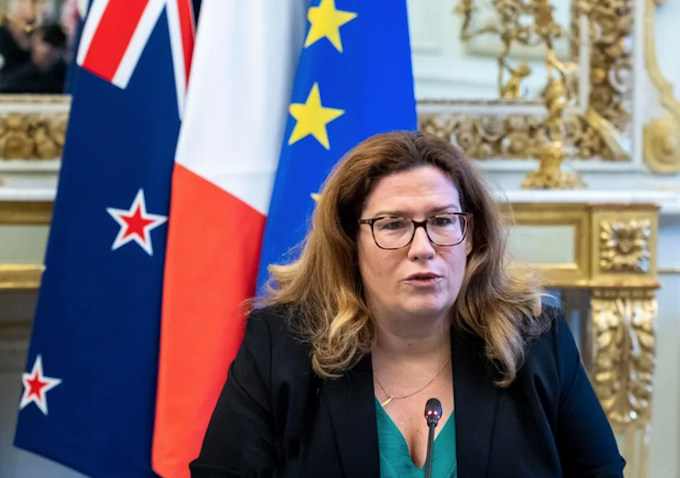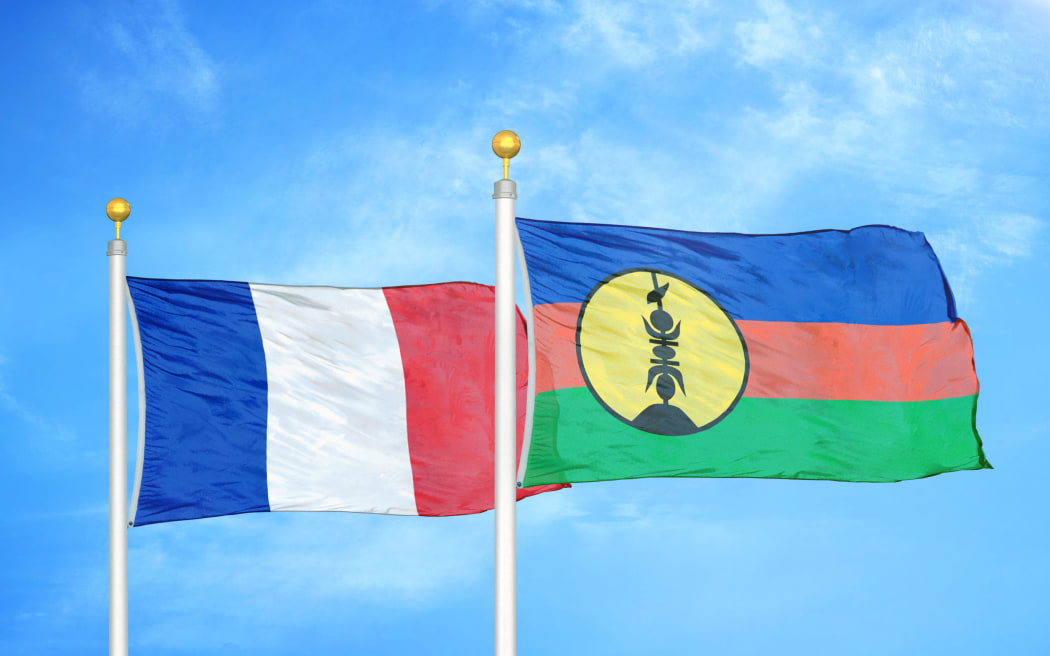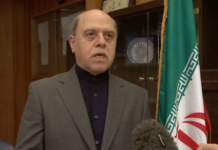
ANALYSIS: By Patrick Decloitre, RNZ French Pacific correspondent
A prominent pro-France leader in New Caledonia, Sonia Backès, has resigned from the French government after a resounding defeat at France’s Senatorial elections four days ago.
In July 2022, Backès, a member of French President Macron’s Renaissance party, had been appointed Assistant Minister for Citizenship in French Prime Minister Elisabeth Borne’s government.
She is also President of New Caledonia’s affluent Southern Province and a leading figure within New Caledonia’s pro-France camp.
- READ MORE: FLNKS mayor wins run-off poll to take unprecedented French Senate seat
- Other New Caledonia politics reports
At the Senatorial poll on Sunday, she was vying for one of the two seats reserved for New Caledonia, but lost to Robert Xowie, a pro-independence indigenous Kanak leader from the FLNKS (Kanak and Socialist National Liberation Front) who is also the Mayor of Lifou in New Caledonia’s Loyalty Islands group.
Xowie is the first ever pro-independence leader to be elected to the French Senate.
Backès’ setback had since fuelled speculation that she would have to resign.
Since her appointment to a ministerial position, New Caledonia’s pro-independence movement had raised eyebrows on a possible conflict of interest and the necessary impartiality of the French government in view of future talks about the French Pacific entity’s political future.
On Wednesday in Paris, she is reported to have tendered her resignation to the French President, who is understood to have accepted it, according to French media reports.
Double blow to pro-French camp
The French Senate elections last weekend were a double blow for the pro-French camp in New Caledonia: for the other contested seat, another pro-French candidate, Georges Naturel, Mayor of the small town of Dumbéa near Noumea took the seat in spite of his candidacy was not endorsed by his own political party, Les Républicains (LR).
Incumbent Pierre Frogier, 72, a veteran politician in New Caledonia, who was bidding for another mandate, also lost.
He has since publicly announced this defeat marked “the end of (his) public life” which spanned half a century.
Frogier is one of the few remaining politicians in New Caledonia who had signed both the Matignon-Oudinot Accord in 1988 (marking the end of half a decade of a bloody civil war) and the Nouméa Accord 10 years later in 1998, setting the roadmap for a gradual process of enlarged autonomy and a transfer of powers from France to New Caledonia.
But 25 years after its signing, the Nouméa Accord is coming to an end and the three referendums it prescribed have been held over the past 5 years.
Holding those three referendums was a key provision of the Nouméa Accord and the majority of voters responded “no” to the question “Do you want New Caledonia to access full sovereignty and become independent?”
Since then, Paris regards this outcome as an unequivocal indication that New Caledonia wants to remain French.
The first two referendum results were no (56.67 percent, November 4, 2018) and no (53.26 percent, October 4, 2020).
However, the FLNKS is contesting the validity of the third referendum’s results (96.50 percent for no, December 12, 2021). However, less than half, 43.87 percent, of the registered voters turned out for this referendum due to the Kanak boycott of the poll after the covid pandemic ravaged the community.

‘A response to neo-colonial attitude’
Sunday, September 24 was not only Senatorial election day in France.
In New Caledonia, ironically, it was the “Citizenship Festival”, a new way to mark this year — the 170th anniversary of what used to be called the “Day of Taking Possession”, a direct reference to the first French landing, September 24, 1853, when French Commodore Febvrier-Despointes “took possession” of the islands on behalf of Napoleon III and planted the French tricolour flag in the small coastal village of Balade.
The electoral setback is also perceived as a strong message sent from the pro-independence camp to Paris, as parties have last month resumed talks on New Caledonia’s political future.
“[The victory] is a response to President Macron’s neo-colonial attitude which persists in ignoring that our country is engaged in an irreversible decolonisation process,” the FLNKS wrote in a media release earlier this week.
“It is also a stinging response to [France’s] unacceptable ‘martyr’ document,” the release adds in a direct reference to a draft document outlining suggestions for future changes to New Caledonia’s institutions, citizenship and self-determination modus operandi.
For instance, under the French suggestions, there would no longer be a deadline for any future referendum for New Caledonia, no more “yes” or “no” options, but the matter would be considered if a “project” was submitted to approval after bipartisan talks.
Other suggestions relate to the notion of a New Caledonian citizenship, which would co-exist with a French citizenship and would be detailed in a scheduled Constitutional amendment that President Macron would like to have voted by the French Congress (a gathering of both Houses of the French Parliament, the National Assembly and the Senate) sometime early 2024.
The document has been dubbed “martyr” by France’s Home Affairs and Overseas minister Gérald Darmanin during talks early September in Paris because it was destined to be discussed and largely debated by all sides of New Caledonia’s political spectrum.
Another round of talks is scheduled to take place in October in Nouméa with Darmanin.
Backès’ rebuff and subsequent resignation are said not to have any impact on the October schedule.
Fractured political landscape
But the new situation leaves a largely fractured political landscape in New Caledonia.
On the pro-independence side last week, one of the main and largest components of FLNKS, the Union Calédonienne (UC), back-tracked on its earlier commitment to attend the Nouméa talks.
Its spokesperson, Gilbert Tyuienon, said the “martyr” draft was “unacceptable” and “not serious” because it cast doubt on New Caledonia’s self-determination process.
Other components of the pro-independence umbrella, the PALIKA (Parti de Libération Kanak) and the UPM (Union Progressiste Mélanésienne), however, said they remained committed to further talks with Darmanin.
On the pro-France side, Backès’ senatorial setback and subsequent resignation also leaves a deeply divided terrain, some of its leaders admitting their recent skirmishes had largely contributed to the defeat and deprived them of a voice within the French Senate and more generally on the French National political scene.
It has since transpired that both Xowie and Naturel’s victory resulted from a secret exchange of votes agreement struck between the two, on a bipartisan basis.
This triggered furious reactions from the pro-France side, which have since labelled Naturel as a “traitor”.
This article is republished under a community partnership agreement with RNZ.










































